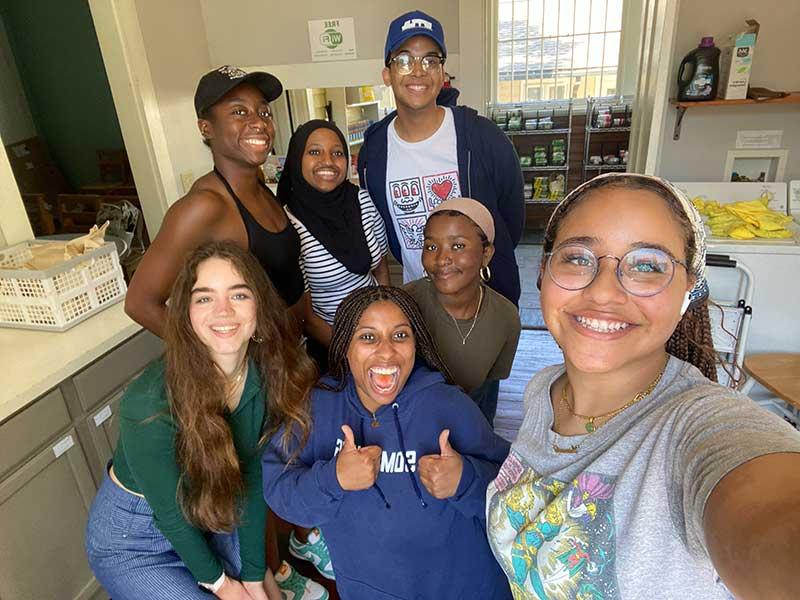Organizers of new food pantry hope to nourish minds and bodies
When Janae Burney began her freshman year at Tulane University in the fall of 2021, she had already begun pondering ways she could make a difference. A Posse Scholar and public health major from Los Angeles, she long had an interest in health equity and knew that Tulane, with its emphasis on public service, would be the perfect venue for her to contribute, especially in the area of food insecurity.
She began researching the topic of food pantries on college campuses and learned through the College and University Food Bank Alliance that more than 200 institutions have on-campus food pantries to serve students and staff.
The reason? According to a 2020 study, 29 percent of students at four-year colleges and 38 percent at two-year colleges experience food insecurity, defined by the U.S. Department of Agriculture as a lack of consistent access to enough food to live an active, healthy life. The numbers largely affect students who live off campus and require some extra support.
"I started this group because food insecurity is something I’ve always been interested in. With help, I knew this was something I could do. We have a great group of people doing the work."
Janae Burney, president of the Tulane chapter of Students Against Food Insecurity
Burney made it her mission to start a pantry for the Tulane community. So far, she said, the pantry has received support across campus, including from the Center for Public Service (CPS), Tulane Hillel, the Center for Academic Equity and the general Tulane community, which through a WaveStarter fundraising campaign donated more than $2,000.
Her group, Students Against Food Insecurity (SAFI), has more than 100 volunteers, including fellow Posse Scholars and members of the Kaleidoscope Residential Learning Community, a student group focused on social justice.
Their efforts have paid off in a big way. On Sunday, Aug. 27, the group cut the ribbon for a new food pantry at 7215 Zimple St., part of The Chapel of the Holy Spirit, just across the street from campus.
Tulane has welcomed the initiative, calling it a complement to existing university services to combat food insecurity. In addition to a robust emergency funding program that supports students in need, Tulane, in partnership with Sodexo, participate in a national program called Swipe Out Hunger. Through the collaboration, free meal swipes are available to students in need of assistance, with no impact to financial aid. The swipes can be used anywhere meal swipes are accepted on Tulane’s campus. Tulane is also among numerous Louisiana colleges designated a "hungre-free campus" by the Louisiana Board of Regents. To qualify for the designation, schools must establish a Hunger-Free Task Force, inform students who receive need-based aid of their potential eligibility to reeive SNAP benefits, hold or participate in at least one anti-hunger awareness event each academic year and assess the need to provide access to to on-campus food distribution or food pantries.The uptown pantry will stock fresh fruits and vegetables along with non-perishables such as canned tuna, boxed mac and cheese, cereal, almond milk, granola bars, crackers, oatmeal and peanut butter. It is open to any Tulane student or staff member, who can order food through a QR code and have their groceries ready for pickup at a designated time.
“I started this group because food insecurity is something I’ve always been interested in,” Burney said. “With help, I knew this was something I could do. We have a great group of people doing the work, from the executive board to our sponsor Maurice Smith.
Smith, associate director of the Center for Public Service, offered guidance and mentoring and connected the group to Second Harvest Food Bank and the Community Fridge Movement to get even more advice on operating a food pantry. He said CPS Executive Director Agnieszka Nance and the center’s advisory board were so excited about the initiative that they agreed to include the pantry and SAFI as part of their funding to support student engagement.
To even get to the point of opening, the group researched other campus food pantries, including Tulane School of Public Health and Tropical Medicine's Food for Thought pantry at the Tidewater Building downtown. Burney’s visit to the UCLA food pantry convinced her that this was a project she and her like-minded friends could tackle. As the group was looking for a location, the Rev. Watson Lamb offered the group a room at The Chapel of the Holy Spirit.
“We had the freedom to go in and clean it up. We made some repairs, ordered shelving and did a deep cleaning. It was a huge undertaking,” she said.
At the end of the 2022-23 school year, they partnered with Tulane’s Resident Hall Association on a food drive called “Wave Away Hunger.” They asked students with leftover Wavebucks to purchase non-perishable food at designated campus locations. They also held a “Battle of the Cans” competition to see which student group could collect the most non-perishable food items.
When a young alumna learned of the group’s efforts, she made a generous donation as well, Smith said. “She strongly believes in the fight against students experiencing food insecurities. This situation touched her life directly at one point in her undergraduate career, and she felt that it was a great way to give back.”
SAFI members are grateful for the support they’ve received across campus and beyond. “A lot goes into making an impact that is tangible, meaningful and most importantly sustainable,” said Joseph Benefiel, a Posse Scholar and the group’s first vice president. “We've put a lot of systems in place to not only keep ourselves accountable but to keep the pantry open long after we've graduated.”

